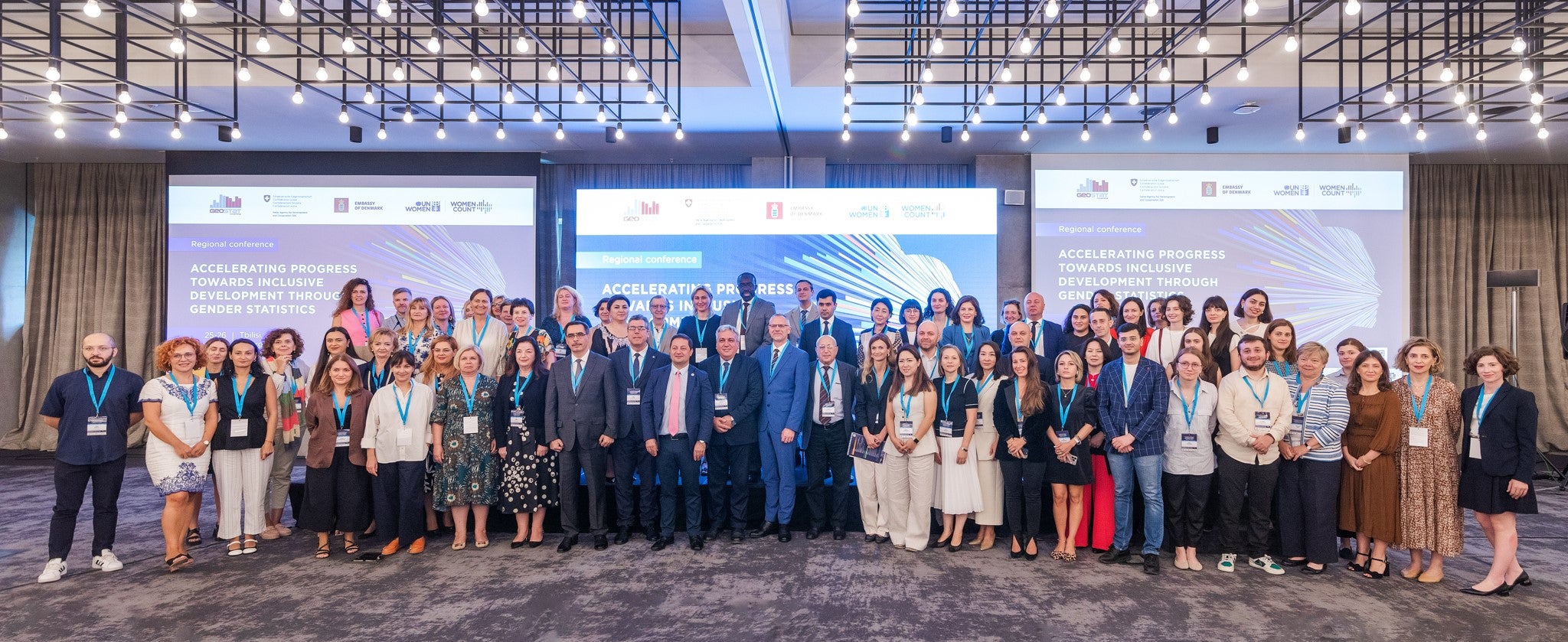Regional conference in Georgia unites over 60 experts to advance gender statistics for inclusive development in Europe and Central Asia
Date:

On 25-26 July 2024, UN Women and the National Statistics Office of Georgia (GEOSTAT) hosted the second regional conference “Accelerating progress towards inclusive development through gender statistics” in Tbilisi, Georgia. The conference brought together over 60 senior statisticians and gender focal points from national statistical offices from across Western Balkans, Türkiye, Eastern Europe, Caucasus, and Central Asia, as well as researchers, and policy makers from regional and international organizations.
“The regional conference celebrates 105th anniversary of GEOSTAT and 25 years of collecting gender statistics in Georgia. Heads of statistical offices from 18 countries around the world are participating in the event. I would like to congratulate all statisticians on this day and thank them for their fruitful cooperation,” said Gogita Todradze, Executive Director of GEOSTAT, during his welcoming remarks.
The two-day conference aimed to provide a platform for exchanging knowledge and sharing best practices and experiences on leveraging gender data and evidence for informed policy-making on gender equality and the empowerment of women. The participants took stock of the national strategies and practices for the collection and use of gender data for better policy-making. They also shared progress made by countries to increase data availability in emerging areas such as violence against women, unpaid care work, gender pay gap, data disaggregation to ensure no one is left behind and unlocking the power of gender data communications. Representatives of the national statistical offices also shared promising practices and experiences on harmonization and improvement of measurements and the use of gender data across the region to further enrich learning and peer exchange.
“Better gender statistics are essential for informed policies and improved lives. We need strong leadership from the National Statistical Office and the broader National Statistical System, along with gender-responsive planning, coordination, collaboration, and advocacy,” underlined Papa Seck, UN Women Chief of Research and Data Section, during his keynote speech. “Investing time and resources in these elements is essential for sustaining long-term progress.”
Gender data availability in Europe and Central Asia
According to UN Women’s recent assessment, more gender data are available in the Europe and Central Asia region since 2015 to track the Sustainable Development Goal (SDG) 5 “Achieve gender equality and empower all women and girls”, up from 18 to 59%, with greater progress across Eastern Partnership countries, the Western Balkans and Türkiye. Of the 18 countries in the region, 15 have at least half of SDG 5 gender data available. Despite this progress, several challenges remain, and more work needs to be done to improve the availability, timeliness, quality, and use of gender data within the social protection, economic, and climate domains.
Tackling gender inequalities in unpaid care and domestic work
Only 39% of data required to measure women’s unpaid care work are currently available. UN Women supports countries, such as Armenia and Georgia, in conducting time-use surveys to ensure that women’s unpaid domestic and care work is measured, recognized, reduced and redistributed through effective policy responses and broader investments in the care economy. Thanks to findings of the Time Use Survey in Georgia, private sector companies such as TBC and Terabank are using these data to champion paternity leave and challenge social norms around childcare. Beyond these private sector uses, the findings of the survey are also shaping the country’s Public Service Law through a Gender Impact Assessment (GIA). The GIA identifies and analyses the main barriers to women’s leadership in public service and makes evidence-based legislative and policy recommendations on how to improve the law, including the proposal for introduction of non-transferable paid paternity leave for public sector employees.
Leveraging on data to end violence against women and girls
83% of the data needed to measure violence against women (VAW) by an intimate partner are now available, although the frequency of data collection remains an issue. So far, Albania, Georgia, and Kazakhstan are the only countries in the region that have completed two rounds of VAW prevalence surveys since 2015 which help identify trends and measure violence prevention and response efforts. UN Women will further support Belarus, Kyrgyzstan, and North Macedonia in conducting the first-ever prevalence surveys on VAW by 2025.
During the closing remarks, GEOSTAT and UN Women awarded certificates of appreciation to the national statistical offices in the region for their unwavering commitment and significant contribution to advancing gender equality through improving the production, use, and accessibility of gender data in their countries.
The conference was organized by UN Women and GEOSTAT within the regional programme “Making Every Woman and Girl Count” (Women Count) with the generous support of the Swiss Agency for Development and Cooperation and the Ministry of Foreign Affairs of Denmark.
For more information, please reach out to Meriza Emilbekova, Communications Officer of the UN Women Regional Office for Europe and Central Asia at meriza.emilbekova@unwomen.org.






